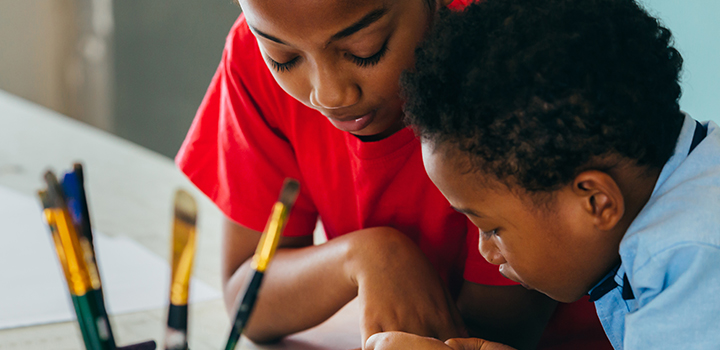COVID-19 - How to comfort and help your children cope

News about COVID-19 is non-stop at the moment. Many adults are sifting through an enormous amount of information daily. Can you imagine how this is all being interpreted by young minds?
The uncertainty of the current COVID-19 pandemic has surfaced feelings of stress and anxiety for many of us. As much as these feelings impact adults, they can also be strongly felt by children of all ages too.
Their schools have been closed, events they may have been looking forward to have had to be postponed or cancelled and they’ve had to be separated from friends for a while too. Changes like these are unsettling. To better support children through such disruptions, how can parents create some sense of (temporary) normalcy in the home?
Have calm and proactive conversations
Your children already may be looking up to you for guidance and reassurance. This a natural thing for children to do during stressful times. For parents, this is an opportunity to steer children in the right direction when it comes to processing uncomfortable information and developing problem-solving skills.
1. Set aside one-on-one time with your childrenMake the time to sit down with your child for however long a period they may need each day.
Talk to them about what’s going on around them. Let their questions guide you. It’s important to answer their questions honestly – help them to understand the facts, but be mindful of overloading them with too many unnecessary details.
Avoiding the topic altogether is not advisable. This doesn’t protect children at all. Rather be honest and accurate about what you share with them. If there’s misinformation about, help to correct it through your conversations. Children are imaginative and may perceive things in a somewhat worse light than reality. So explain things in a way that’s reassuring and honest, as well as age-appropriate.
Remember, it’s okay if you can’t answer a question. Sometimes the answer may not be all that clear while much is still being clinically determined. Admit this to your child. Reassure them that you’ll try and find out what they’re curious about.
Younger children typically ask questions, listen momentarily, continue with an activity or play for a bit and then repeat the same type of cycle. Be patient with young children – this is how many little ones absorb information. Allow this kind of process as it helps to reduce levels of anxiety or fear.
2. Listen to your child / childrenBy showing your child that you are willing to talk, as well as listen, offers them reassurance. They’re exposed to information in some way already. Encourage them to open up and allow them to be heard.
When you understand their perspective better, you can offer the kind of reassurance and support they really need. It also gives them a sense that the family will get through what they need to, together.
Allow emotions
1. Yours and those of your childrenUnderstand your child’s emotions within their context. Allow these emotions. Things have changed and it was through no fault of their own. Many children will feel deeply disappointed about missing out on things they normally do and enjoy.
A little sadness is okay. It helps process things. Some children may not be comfortable verbalising their emotions. Some will. Others may like to write things down or draw. Encourage whatever method of expression works best for your child.
We’re all processing change. For adults with more life experience, the context is greater. We know that this period of disruption will be temporary and slowly the way we normally did things will return. For children, and depending on their age, this may not be such an obvious thought.
Help your child through their emotions and reassure them that things missed out on now are not major losses in their lives. By being empathetic and supportive, children can learn to process their emotions better.
Share some of your own feelings too and set an example to children by showing them how you’re learning to cope.
2. Emotional distress and mental healthEmotional discomfort can impact overall mental wellbeing for adults and children alike. The emotional impact ranges from a little anxiety about the unknown, and in other instances, reactions may be more intense - especially teenagers or those with a history of anxious or depressive moods and behaviours.
Parents can keep a close eye on their children and monitor their emotions. Should things reach a more intense level, it’s important to realise that although we’re all confined to our homes, we’re not entirely alone in dealing with issues impacting mental health. SADAG (The South African Depression and Anxiety Group) is available to provide telephonic guidance.
Different age groups may react differently. Parents can be on the lookout for the following:
- Pre-schoolers: Bedwetting, thumb sucking (abnormal), clingy behaviour, sleep disturbance, appetite loss, fear of the dark, withdrawal or regressive behaviours.
- Primary schoolers: Aggressiveness, irritability, clinginess, sleep disturbances (especially nightmares), trouble with concentration, withdrawal from certain activities with the family, avoiding virtual or telephonic contact with friends and a reluctance to get their school work done.
- High schoolers: Teens may display similar types of behaviour problems as younger children, especially agitation (prone to initiating conflict), poor concentration, eating changes and sleep disturbances.
Teach your children about stigma
It’s possible that such negative and hurtful behaviour may make a nasty appearance in your child’s life in some way or another.
Help your child understand the nastiness of such behaviour - COVID-19 has nothing to do with the way a person looks, what language they speak or where they come from. This is a great opportunity for parents to instil compassionate behaviours in their children.
There are plenty stories making the rounds where compassion is displayed. Share these with your child (where appropriate) as a way to show them what heroic kinds of behaviour look like.
Involve your child in some family decision-making
By asking your child what they’d like to do during their time at home, you enable a little self-confidence. Not everything they’d like to do will be possible, but through conversation you can reach an agreement as a family that will be productive and understanding.
Be mindful of the language you use
Positive words can go a long way. Remember, you’re all under the same roof for more time than you’re used to. So, it’s better to avoid household conflict as much as possible – it only intensifies stress. “Please tidy up” instead of “Stop making such a mess” may have a better outcome for all.
Some praise for what you’ve noticed children have done right can also be helpful in establishing harmony. Did they clean up after themselves without having to be asked? Notice these actions and mention it. A show of affection will work wonders too. It reinforces positive attitudes and assures them that you care. They may even repeat such behavioural actions again!
Develop a new routine
Everyone’s normal routine has been disrupted. A new consistent, but flexible routine can help to give a household some sense of structure and purpose again. Parents can set the example here by not only developing a new routine but following it daily too.
Families can create a daily schedule together, incorporating all of the essential things each member needs to do. This includes structured activities, like school work and homework, as well as free time and exercise. Make a timetable together – if children are involved in the process they’re more likely to follow it a little better too. It gives them something to focus on and also helps with keeping behaviour in check.
Create distractions that provide relief
Work distractions into a daily schedule for some light relief, or play it by ear as needed. Children may be processing different emotions – so take your cues from them as to when they need an appropriate distraction.
Distractions can include indoor games and story times, or if a child is old enough, help adults in the kitchen with preparing a family meal.
For older children in particular, monitor the amount of time spent on social media platforms. As a parent, you can allow some leeway, but help your child understand that constant access is not necessarily a good thing even though they have more time on their hands to browse different internet applications.
Television viewing is a distraction for most of us, and thus is important to indulge in, in healthier ways. Remaining glued to screens for hours at a time isn’t ideal – split distraction time to include a variety of stimulating things. Use your family’s interests as a starting point. You could safely exercise together, play games or take an online course. Healthy stimulation is a good means of distraction and discouraging restlessness.
All medical information found on this website including content, graphics and images, is for educational and informational objectives only. Discovery Health publishes this content to help to protect and empower all South Africans by promoting a better understanding of COVID-19.
Find a healthcare professional near you
Find a doctor or hospital near you online or by using the Discovery app.
Related articles

Outbreak of the 2019 novel coronavirus
The 2019 novel coronavirus (2019-nCoV) has caused an outbreak of fatal respiratory illness first detected in Wuhan, China. This is a completely new strain with no vaccines available. The best way to prevent infection is to avoid being exposed to this virus.

Understand the Novel Coronavirus (COVID-19) and prevent infection
No country is immune to the spread of the Novel Coronavirus - officially named COVID-19 by the World Health Organization (WHO). The outbreak has reached pandemic proportions and been declared a global public health emergency.

Novel Coronavirus - wash your hands of the threat
As toddlers, we learnt to wash our hands. But, did we ever master the skill to the extent that is needed to wash pathogens off our hands, and save lives? Multiple studies show people don't wash their hands at the right times, in the right way or for the right amount of time. We contaminate the things and people we touch with the germs we carry on our hands.